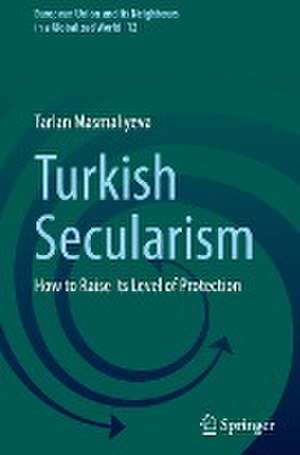Turkish Secularism: How to Raise Its Level of Protection: European Union and its Neighbours in a Globalized World, cartea 12
Autor Tarlan Masmaliyevaen Limba Engleză Hardback – 15 dec 2023
There are any number of studies on Turkish secularism. However, to date there has never been a comprehensive analysis of the constitutional protection of secularism, one that systematically covers all relevant aspects. Addressing that gap, this book presents a comprehensive and coherent analysis of the constitutional framework of this principle within the Turkish legal system.
Secularism is a common fundamental principle of all three Turkish constitutions (1924, 1961, 1982). The principle has been granted an irrevocable status and has been strictly constructed within the Turkish constitutional system. Despite the guarantee of irrevocability, however, its interpretation and application have undergone a drastic transformation in response to changing social and political circumstances.
Today, the complaints filed before the domestic and international judiciary predominantly concern the Turkish State’s neutrality and impartiality towards religion and the exercise of freedom of religion by religious minorities. While many observers have interpreted these problems in light of the contemporary policies pursued in the field of religion, a closer look reveals that the problem lies deeper in Turkey’s general constitutional framework. While the 1982 Constitution declares the principle as an unamendable characteristic of the Republic and protects it with multi-layered mechanisms, certain anti-democratic features of the Constitution, including the President’s predominant role in forming the high-ranking judiciary, affect the proper and consistent application of the principle of secularism.
The consolidation of the secular state order depends on various factors other than a suitable constitution. However, it goes without saying that constitutions can help or hinder efforts to find solutions. Therefore, this book identifies the deficiencies in the Turkish constitutional and legal framework regarding the protection of secularism. It presents the historical development and definition of a secular state, analyzes the jurisprudence of the Turkish Constitutional Court and the European Court of Human Rights, studies the application of the party prohibition mechanism as a means of protecting the principle, and assesses the constitutional amendments of 2001, 2010 and 2017. Moreover, it proposes much-needed constitutional and legal amendments with a view to improving the application of the principle of secularism.
Preț: 786.36 lei
Preț vechi: 958.98 lei
-18% Nou
Puncte Express: 1180
Preț estimativ în valută:
150.48€ • 156.16$ • 125.78£
150.48€ • 156.16$ • 125.78£
Carte tipărită la comandă
Livrare economică 17-31 martie
Preluare comenzi: 021 569.72.76
Specificații
ISBN-13: 9783031460104
ISBN-10: 3031460103
Pagini: 267
Ilustrații: XI, 267 p.
Dimensiuni: 155 x 235 mm
Greutate: 0.57 kg
Ediția:1st ed. 2024
Editura: Springer Nature Switzerland
Colecția Springer
Seria European Union and its Neighbours in a Globalized World
Locul publicării:Cham, Switzerland
ISBN-10: 3031460103
Pagini: 267
Ilustrații: XI, 267 p.
Dimensiuni: 155 x 235 mm
Greutate: 0.57 kg
Ediția:1st ed. 2024
Editura: Springer Nature Switzerland
Colecția Springer
Seria European Union and its Neighbours in a Globalized World
Locul publicării:Cham, Switzerland
Cuprins
Introduction.- The Historical Development and Definition of a Secular State.- The Constitutional Development and Regulation of Turkish Secularism.- The TCC’s Approach to Secularism in Freedom of Religion Cases.- Protection of Secularism within the Framework of the Political Party Regime.- The Impact of the 2017 Constitutional Amendments on the Protection of Secularism.- The ECtHR and Turkish Secularism.- Conclusion.
Notă biografică
Dr. Tarlan Masmaliyeva accomplished her Bachelor of Law studies at the Law Faculty of Baku State University in Baku, Azerbaijan (2009). She acquired her LL.M. degree in European Law from the Europa-Institut of Saarland University (2014) and her Doctor of Law degree from the Law Faculty of Saarland University in Saarbrücken, Germany (2023).
Textul de pe ultima copertă
There are any number of studies on Turkish secularism. However, to date there has never been a comprehensive analysis of the constitutional protection of secularism, one that systematically covers all relevant aspects. Addressing that gap, this book presents a comprehensive and coherent analysis of the constitutional framework of this principle within the Turkish legal system.
Secularism is a common fundamental principle of all three Turkish constitutions (1924, 1961, 1982). The principle has been granted an irrevocable status and has been strictly constructed within the Turkish constitutional system. Despite the guarantee of irrevocability, however, its interpretation and application have undergone a drastic transformation in response to changing social and political circumstances.
Today, the complaints filed before the domestic and international judiciary predominantly concern the Turkish State’s neutrality and impartiality towards religion and the exercise of freedom of religion by religious minorities. While many observers have interpreted these problems in light of the contemporary policies pursued in the field of religion, a closer look reveals that the problem lies deeper in Turkey’s general constitutional framework. While the 1982 Constitution declares the principle as an unamendable characteristic of the Republic and protects it with multi-layered mechanisms, certain anti-democratic features of the Constitution, including the President’s predominant role in forming the high-ranking judiciary, affect the proper and consistent application of the principle of secularism.
The consolidation of the secular state order depends on various factors other than a suitable constitution. However, it goes without saying that constitutions can help or hinder efforts to find solutions. Therefore, this book identifies the deficiencies in the Turkish constitutional and legal framework regarding the protection of secularism. It presents the historical development and definition of a secular state, analyzes the jurisprudence of the Turkish Constitutional Court and the European Court of Human Rights, studies the application of the party prohibition mechanism as a means of protecting the principle, and assesses the constitutional amendments of 2001, 2010 and 2017. Moreover, it proposes much-needed constitutional and legal amendments with a view to improving the application of the principle of secularism.
Caracteristici
Comprehensively and systematically analyzes the principle of secularism in Turkey in theory and practice Elucidates the peculiarities of Turkish secularism, identifies deficiencies, and proposes improvements Includes a comprehensive, in-depth examination of the ECtHR cases regarding various aspects of Turkish secularism












